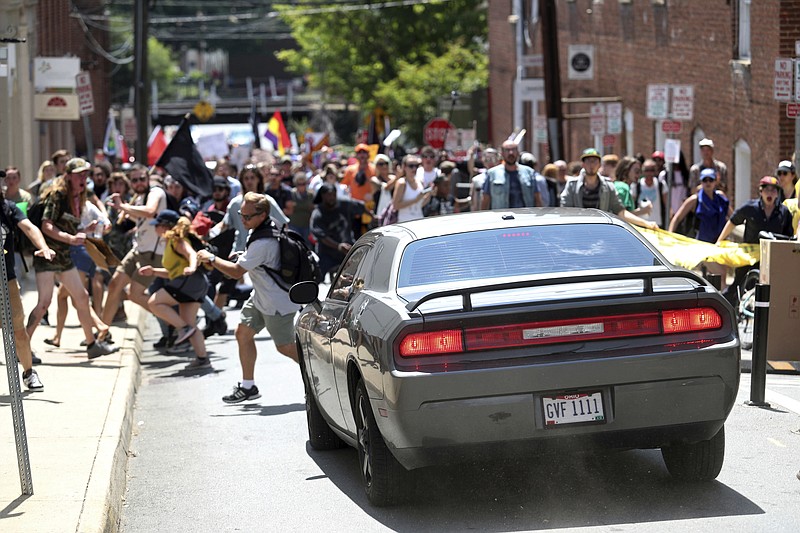It's not about Donald Trump.
People who blame the president of the United States for a white supremacist rally that turned violent in Charlottesville, Va., Saturday already have lost the lessons of history and have perpetuated the problem.
Hate should not beget hate.
But national commentaries to social media to Chattanooga protesters have done just that. They have answered hate for one thing with hate for another.
We fear they will reap the whirlwind.
Trump responded to Saturday's hostility in an inelegant, all-too-Trumpian way. While he condemned "this egregious display of hatred, bigotry and violence," he added the words "on many sides."
To some, that indicated he felt there was another "side" that deserved responsibility for the violence that included a car roaring into a crowd of counter-protesters, killing one. However, he also said that "we all must be united [and] condemn all that hate stands for," that "there is not a place for this kind of violence in America," and that we all should "come together as one!"
It wasn't enough for Trump foes, who felt he should have vilified white supremacists, Neo-Nazis, the Ku Klux Klan or any other groups that promoted the initial protest of the removal of a statue of Confederate Gen. Robert E. Lee from a city park. He did that Monday - we wish he'd done it Saturday - but it won't matter.
Opponents of Trump are willing to politicize even the violence of hate groups as long as it casts a darker light on the president.
We see Saturday's violence, instead, as an outgrowth of perceived power vs. perceived powerlessness - all imbued with race. That still doesn't make it right.
Removing Confederate statues is less about bruised feelings anyone may feel today from monuments erected more than a century ago marking a war more than a 150 years ago than it is about having the power to have the statues removed.
If you have the power to have a statue removed, you have clout, meaning those who want to see the statue stay where it is do not have clout and are powerless.
The mostly young men who gathered to protest the potential removal of a statue evidently felt powerless, not only powerless to keep what they see as a Southern icon in place but also perhaps powerless to get the kind of job they want, to finish an education they struggled with, to earn the kind of money that allows them to keep up with the Joneses. But feelings of powerlessness alone find voice when they join others for a cause.
In the United States, that cause can find voice in a First Amendment protest - for racial equality, against the Affordable Care Act, for jobs, against the removal of a statue.
Such was the stage for Friday night's initial event in which white nationalists carried torches through the University of Virginia campus in what they advertised as a "pro-white" demonstration. While such an incident was legal, it only brought to mind similar ugly marches in Nazi Germany before World War II and Ku Klux Klan rallies in the Jim Crow South more than a half century ago.
The "pro-white" theme, though, should be an affront to all of us if we believe we are created in the image of God and, therefore, are all equal. Beyond rallying to save a statue - a work of art, a symbol of heritage - it pokes a stick in the eye of anyone who is not white. It's not an appropriate or effective way to have debate or facilitate discussion. In fact, violence shuts everyone down.
Which brings us back to Trump.
The election of the New York businessman last November was brought about by many who felt that powerlessness we mentioned earlier. Yes, some citizens feel powerlessness over the removal of statues, but millions more felt powerless as an economic recovery passed them by, as illegal immigrants have taken American jobs and benefits, as a government health care program increased their insurance costs or may have robbed them of their doctor or as a White House continuously seemed to govern against the will of the people.
Trump gave voice to those concerns, spoke with an abandon and an indecorousness that previous presidents had not, and had the temerity to answer his critics, often rudely.
Many of his supporters - ones who shrink in horror from the cruelty of the behavior seen over the weekend - nevertheless feel someone finally has their backs. If
Trump's comments make others think they have cover to perpetuate such violence, we hope the president will continue to assure them they do not, will not and cannot. He won't silence his critics, but it's the right thing to do.
